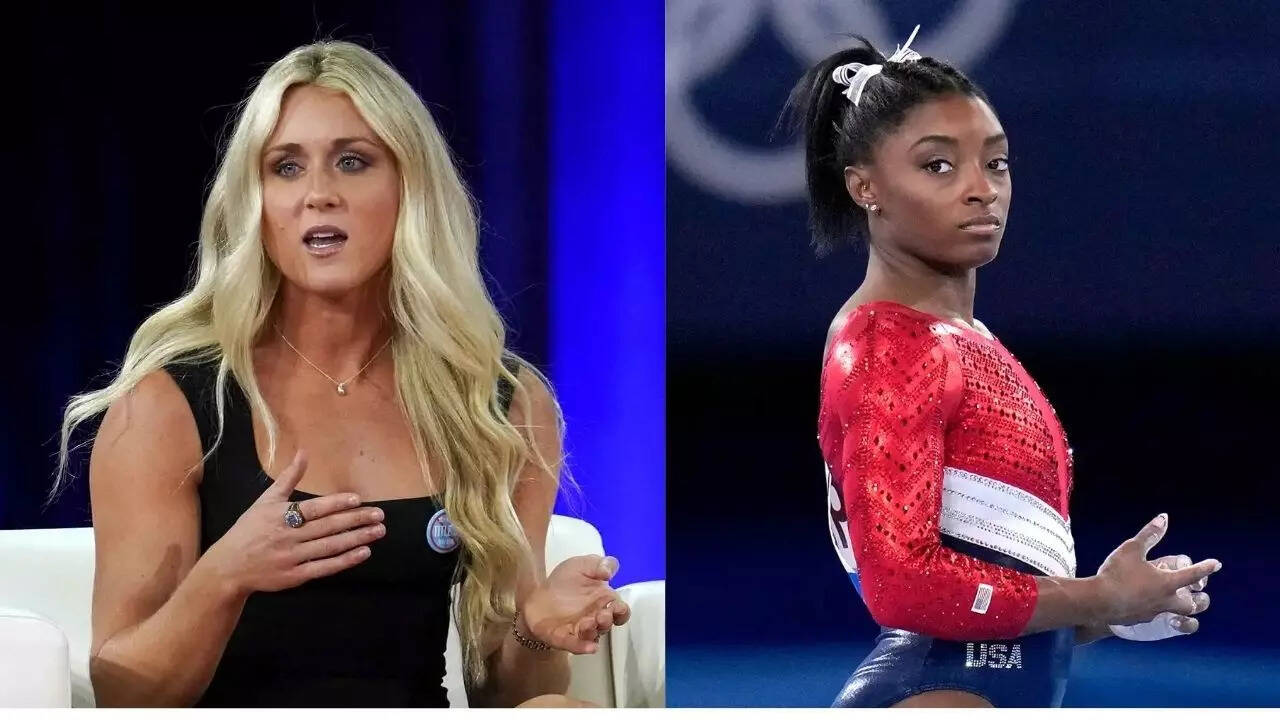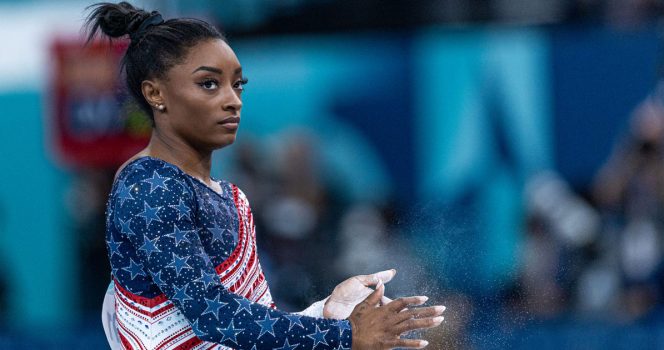Olympic champion Simone Biles recently became part of a high-profile online discussion following her response to a post by former NCAA swimmer and sports commentator Riley Gaines regarding transgender athletes in women’s sports. The exchange, which unfolded on the social media platform X (formerly Twitter), has added momentum to a broader public conversation about inclusion, fairness, and the role of athletes in shaping policy.
The Context Behind the Debate
The conversation began when the Minnesota State High School League shared a post celebrating Champlin Park High School’s victory in the Class AAAA Softball State Championship. While the intent was to highlight the team’s achievement, the post drew a controversial response from Riley Gaines, known for her advocacy for policies that restrict transgender women from competing in women’s sports categories.
Gaines’ response, though not naming any individuals, drew significant public attention and criticism. Advocates for LGBTQ+ inclusion interpreted the comment as targeting a transgender athlete on the team, though no direct confirmation of such involvement was made by the league or the school.
Simone Biles responded to the situation by reposting the exchange and sharing her perspective, emphasizing inclusivity and the importance of respectful public dialogue.

Simone Biles’ Advocacy and Public Role
Simone Biles, a four-time Olympic gold medalist and one of the most decorated gymnasts in history, has long used her platform to speak on issues related to mental health, athlete welfare, and equity. While she has largely remained outside of direct political debates, her recent comments reflect a growing trend of athletes using their public visibility to influence conversations beyond sport.
Biles’ remarks were met with both praise and criticism. Supporters applauded her for promoting inclusivity and speaking up in defense of marginalized communities. Others expressed disappointment, suggesting that the discussion on sports policy should remain focused on competitive fairness.
Despite the mixed reaction, Biles’ intervention has amplified national interest in how transgender participation in youth and professional sports is governed.

Riley Gaines and Her Advocacy in Sport
Riley Gaines, a former University of Kentucky swimmer and 12-time All-American, became a national figure in 2022 after tying with transgender swimmer Lia Thomas at the NCAA Women’s Swimming Championships. Since then, Gaines has emerged as a vocal advocate for restricting transgender participation in women’s sports.
She has testified before legislative bodies in the United States, participated in public forums, and partnered with advocacy groups calling for changes to Title IX policies. Gaines argues that transgender inclusion, without regulatory boundaries, could undermine competitive equity and safety in women’s athletics.
This position is supported by some lawmakers and athletic groups, particularly those advocating for gender-based eligibility criteria in competitive sports. However, organizations such as the Human Rights Campaign and GLAAD have criticized such views, arguing that they can contribute to stigmatization and exclusion of transgender youth.

Policy and Legal Landscape on Transgender Inclusion in Sports
The participation of transgender athletes in sports is governed by a patchwork of regulations across schools, athletic associations, and states. As of 2025, more than 20 U.S. states have passed laws restricting transgender women and girls from participating in school sports teams consistent with their gender identity, according to data from the American Civil Liberties Union (ACLU).
At the national level, the Biden administration has proposed updates to Title IX guidelines that would allow transgender students to participate in school sports but grant schools some discretion in making policy for high-competition settings. The proposed changes, announced in 2023 by the U.S. Department of Education, seek to balance inclusion with the preservation of competitive integrity, particularly in elite-level sports.
The International Olympic Committee (IOC) has also revised its framework on transgender inclusion, emphasizing that decisions should be made by individual sporting federations based on fairness, safety, and inclusion. The IOC’s 2021 guidance suggests moving away from blanket hormone-level requirements and encourages evidence-based policy tailored to each sport.

Social Media and Athlete Activism
The online debate between Simone Biles and Riley Gaines reflects a larger trend in sports culture: the increasing willingness of athletes to speak out on political and social issues. This form of digital advocacy can have significant impact, both in shaping public discourse and influencing policy debates.
While some fans expect athletes to remain neutral, others celebrate when sports figures use their platform to advocate for causes they believe in. This division is evident in the reaction to Biles’ comments, with some praising her leadership and others calling for a more restrained public stance.
The influence of athlete activism was notably seen in movements such as “Black Lives Matter,” where figures like Colin Kaepernick and LeBron James brought widespread attention to social justice. Similarly, recent discussions around mental health, led by athletes like Biles and Naomi Osaka, have reshaped how the sports world talks about psychological well-being.

The Importance of Respectful Dialogue
What remains essential in these discussions is maintaining a respectful and fact-based exchange of ideas. Both Simone Biles and Riley Gaines represent passionate viewpoints rooted in lived experience, and their dialogue underscores the complexity of aligning fairness and inclusion in competitive sports.
Medical experts, policymakers, and advocacy organizations continue to study and debate the impact of various regulatory models. The American Academy of Pediatrics and the World Professional Association for Transgender Health (WPATH) recommend affirming care and inclusion of transgender youth in all areas of life, including athletics, while also supporting further research to inform best practices.
At the same time, leading women’s sports organizations, including World Athletics, have introduced new guidelines to address concerns about competitive balance. These include updated policies on testosterone thresholds and athlete eligibility, aimed at ensuring that decisions are made on the basis of science and fairness.
Conclusion: An Ongoing Conversation with National Significance
The exchange between Simone Biles and Riley Gaines highlights an emotionally charged and legally complex debate taking place across schools, sports leagues, and legislative bodies. At its core is the question of how to uphold the values of fairness, inclusion, and respect in athletics.
While high-profile figures may differ in their opinions, the conversation itself signals the importance of transparency, evidence-based policymaking, and empathy for all individuals affected by these issues.
As athletic institutions, lawmakers, and communities navigate this landscape, the voices of athletes—whether supporting inclusion, regulation, or both—will continue to play a pivotal role in shaping the future of competitive sports in America.
Verified Sources:
- U.S. Department of Education – Proposed Title IX Rule (2023)
- BBC News – Simone Biles: Athlete Advocacy
- International Olympic Committee – Transgender Participation Framework
- American Civil Liberties Union – LGBTQ+ Legislation Tracker
- World Athletics – Eligibility Policy
- Human Rights Campaign – Trans Rights in Sports
- WPATH – Gender Diversity in Health and Athletics

